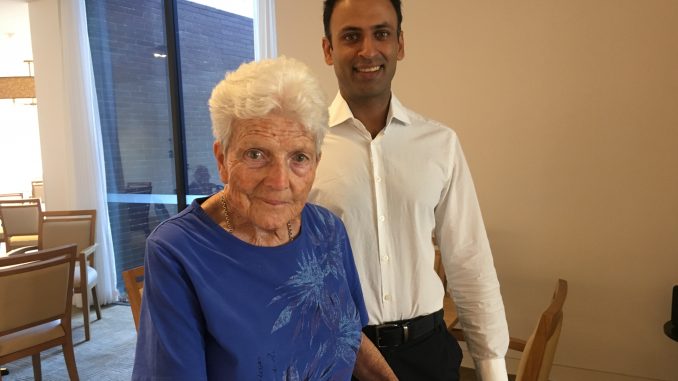
Getting older doesn’t mean your health needs to deteriorate. Staying fit and healthy for senior Australians can be easier than you think. Sanjay Gupta, Physiotherapist, Cranbrook Care examines some of the physical and mental challenges as people age, and how to minimise the effects of getting older.
1)What are some of the challenges in mobility as people age?
Ageing can lead to physical challenges with a person’s ability to move through muscle weakness, joint stiffness and range of movement. This can lead to reduced balance and an increased risk of falls. A person’s physical endurance also tends to decline as they age, meaning that they are not able to walk as far, as quickly, or for as long. Pain and disease may also impact the ease with which older people move. The key challenges with mobility as people age are maintaining the ability to move around easily, painlessly and safely.
2) What are some of your top tips for keeping healthy as you age?
Keeping physically and mentally active, eating well and staying connected are the three most important things to do as you get older. This doesn’t necessarily mean running marathons, completing triathlons, counting calories and posting all about it on social media – it can be a simple as a brisk daily walk, limiting alcohol, stimulating the mind by reading or playing mind stimulating games, and keeping up with friends and family.
Here are Sanjay’s top tips:
Exercise
- Undertake some resistance training exercises at least two to three times a week to maintain muscle mass, strength and joint motion. Also include exercises or activities that target the heart and lungs such as a brisk walk, a gentle cycle or a gentle jog.
- Consider taking up activities such as dancing, gardening, bush walking, yoga, tai chi, swimming or aqua aerobics.
Nutrition
- Maintain a healthy weight by eating a balanced diet and maintaining an active lifestyle.
- Include plenty of vegetables, legumes, nuts and low sugar fruits such as berries.
- Minimise processed foods, salt and sugar.
- Eat plenty of protein. Aim to eat the equivalent of your body weight (in kilograms) in protein (in grams). If you weigh 60 kilograms, you should consume about 60 grams of protein daily. Try to consume lean beef, poultry, eggs or dairy. Tofu is a great substitute for meat for vegetarians.
- Avoid smoking and excessive alcohol (a sherry or two with a celebratory lunch is fine!).
Mental Health
- Keep mentally active by maintaining a social life and staying connected with others.
- Challenge the brain through things like reading, playing chess, Sudoku, bridge or enrol in courses.
- Learn and maintain hobbies and skills.
- Don’t get too anxious about small things.
3) How should diets changes as we age?
As we age, we experience a gradual loss of muscle tissue. On average this is approximately 3 kilograms of muscle loss per decade. In addition to the usual advice for healthy eating (plenty of fresh vegetables, limiting sugars, reducing salt and alcohol intake), as we age it is essential that we eat plenty of protein to give the body the building blocks it needs to maintain and/or reverse the loss of muscle mass. Our bodies are especially receptive to amino acids immediately after exercise, so the 30 minute window after exercise is the best time to eat proteins. Some studies suggest that older adults may need between 20 and 30 grams of protein per meal/snack to stimulate protein synthesis. To put that into context, that’s a reasonable sized chicken breast or a fillet of salmon.
4) How can we keep mobile as we age?
The bottom line is by staying physically active we stay physically mobile. Maintaining muscle mass and muscle strength through progressive resistance training is the most beneficial thing we can do as we age. It not only assists with mobility, balance and bone density, it also helps with maintaining or managing blood pressure, cholesterol and blood sugar levels.
5) What are some of your top exercises for older Australians?
Working at a moderate to high intensity level, choosing exercises that target the major muscle groups as well as the cardiovascular system are the best exercises to do as we age.
Here are my top exercise tips:
- Exercise with weights two to three times per week, performing 8 – 12 repetitions per exercise.
- Add some light impact exercises such as jumping or running to improve bone density.
- Impact exercises in a pool can help if there are pre-existing bone or joint conditions.
- Add balance and stability work like standing on one leg or walking heel to toe. Gradually increase the degree of difficulty by bouncing a ball or choosing an unstable surface.
- Try to exercise in a group, covering off both physical and mental stimulation.
At all Cranbrook Care aged care residences, Reflections wellness centres offer residents a carefully considered approach to health and wellness, featuring hydrotherapy pools, consultations suites and gyms with the latest age-specific exercise equipment imported from Finland. Each residence also has a hair and beauty salon on site and the Leisure and Lifestyle team keep residents busy with a choice of daily activities, including history seminars, art and crafts, games and in-house concerts – designed to maintain emotional wellbeing and keep the mind active.
About Cranbrook Care
Commencing operations in 2000, Cranbrook Care is a multi-award winning provider of premier aged care and retirement residences. Focused on the delivery of quality, age appropriate living for mature Australians, Cranbrook Care’s Aged Care portfolio encompasses Lansdowne Gardens (Neutral Bay) and William Cape Gardens (Central Coast), with brand new residences in Sydney’s Hills Shire (Bella Vista Gardens, Kellyville) and Inner West (Bayswater Gardens, Abbotsford).
For more information, please visit: www.cranbrookcare.com.au
